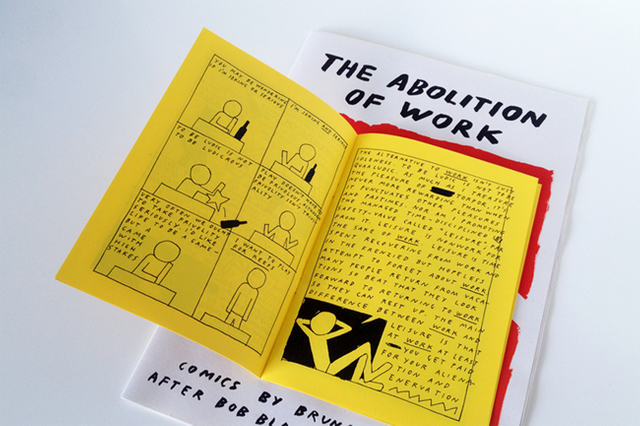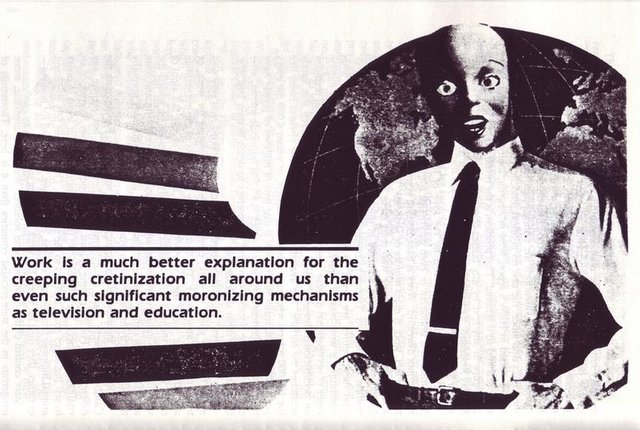The Abolition of Work by Bob Black : Revolt against wage-labour !

The last figurehead of modern libertarian activism, Bob Black does not, however, have the typical profile of an anarchist partisan in the literal sense of the term. Author, analyst and more particularly journalist, the 60-year-old dragged his feets into the Wall Street Journal columns just after graduating in social science at the University of Michigan. Not being, however, from a disadvantaged background, man discovered at his own expense, during his enthronement into the world of work, a society which was then happily wallowing in the mire of ultra-capitalism and this in an uncomplicated way.
The 1980s were for many synonymous with a decadent decade in which money flowed on the principle of ever more exponential growth in household consumption. Although this opulence brought its share of additional comfort, to each stratum of communities composing the famous pyramid of social classes, this one hid on the other hand a completely other face much less glamorous, or the relation to work is regularly associated with a certain moral suffering more and more palpable. It is on this sad observation that Bob Black built the foundations of his manifesto. A bit of a utopian burner against the path of liberal thinking of "working more to earn more" which was then spreading all over the globe...
Neoslavery

First published in 1985, "The Abolition of Work" had a small impact on intellectuals of all kinds during this period. For the first time in decades, an American citizen, a socio-logist of his state, denounces in a 70-page pamphlet the collateral damage of the wage system as we know it. Drawing on Lafargue's writings (which we will certainly discuss in a future article), Bob Black tackles an alienating vision of the world of work which, according to him, does not take care to create autonomous and independent individuals but on the contrary conditions them to enter into an illusion of a certain freedom, conveyed by governments in the pay of finance. In short, a condition of modern slavery achieved by indirect enslavement techniques.
This booklet gives food for thought on a complete overhaul of our institutions towards individual development and professional effectiveness through the use of playful means. The time spent working is a time of servitude, of resignation that kills pleasure and knowledge. Why then push a person to perform a degrading task, without any purpose or intellectual and personal enrichment? If it is not to support a production that is not "guaranteed" by a majority of us...
But modern work has worse implications. People don't just work, they have "jobs." One person does one productive task all the time on an or-else basis. Even if the task has a quantum of intrinsic interest (as increasingly many jobs don't) the monotony of its obligatory exclusivity drains its ludic potential. A "job" that might engage the energies of some people, for a reasonably limited time, for the fun of it, is just a burden on those who have to do it for forty hours a week with no say in how it should be done, for the profit of owners who contribute nothing to the project, and with no opportunity for sharing tasks or spreading the work among those who actually have to do it
Play to work!

Even if the author deliberately adopts a provocative and surrealist tone by advocating full unemployment, he defends plausible and solid arguments. By submitting the introduction of a curriculum based on play, as soon as we enter the educational world, Bob Black advances the idea of a somewhat fanciful and romantic utopia (just like the great libertarian thinkers) that could be described as "useful" productivity. By personally investing each person in his field of predilection, in the service of the well being of the community and not on behalf of corporations that only profit matters... If a child discovers his talents as a coder, a chemist, a farmer and so on, we might as well encourage him in his efforts and interest him all the more in immersing himself in this way, by stimulating him through the playful side of things. Thus finding a daily interest in the practice of his discipline and reinforcing by the same the feeling of accomplishment through his skills.
That doesn't mean we have to stop doing things. It does mean creating a new way of life based on play; in other words, a ludic conviviality, commensality, and maybe even art. There is more to play than child's play, as worthy as that is. I call for a collective adventure in generalized joy and freely interdependent exuberance. Play isn't passive. Doubtless we all need a lot more time for sheer sloth and slack than we ever enjoy now, regardless of income or occupation, but once recovered from employment-induced exhaustion nearly all of us want to act. Oblomovism and Stakhanovism are two sides of the same debased coin.
Bedside book

"The Abolition Of Work" under its impertinent title, is not a work which makes the apology of chaos as one could think it with a biased vision of the anarchist movement. On the contrary, this small manual, although approaching a sweet idealistic dream realized under psychotropic products, contains certain elements that make sense in an increasingly inhuman and automated society. Lafargue announced a leisure society that we are now touching with our fingertips. Bob Black goes much further by proposing a passive revolution, consisting in reviewing our methods of education and professional functioning to get rid of an increasingly heavy burden: that of wage constraint and social pressure. As we all know deep inside ourselves, work done under duress is a suffering from which we cannot escape. Although structurally impracticable, "Work, me? Never" gives us the impetus, the courage and the hope to change things to different degrees. It is up to us to give ourselves the means to free ourselves from this dictate which is imposed on us! Today's sweet dreamers will be tomorrow's great leaders!
The alternative to work isn't just idleness. To be ludic is not to be quaaludic. As much as I treasure the pleasure of torpor, it's never more rewarding than when it punctuates other pleasures and pastimes. Nor am I promoting the managed time-disciplined safety-valve called "leisure"; far from it. Leisure is nonwork for the sake of work. Leisure is the time spent recovering from work and in the frenzied but hopeless attempt to forget about work. Many people return from vacation so beat that they look forward to returning to work so they can rest up. The main difference between work and leisure is that work at least you get paid for your alienation and enervation.